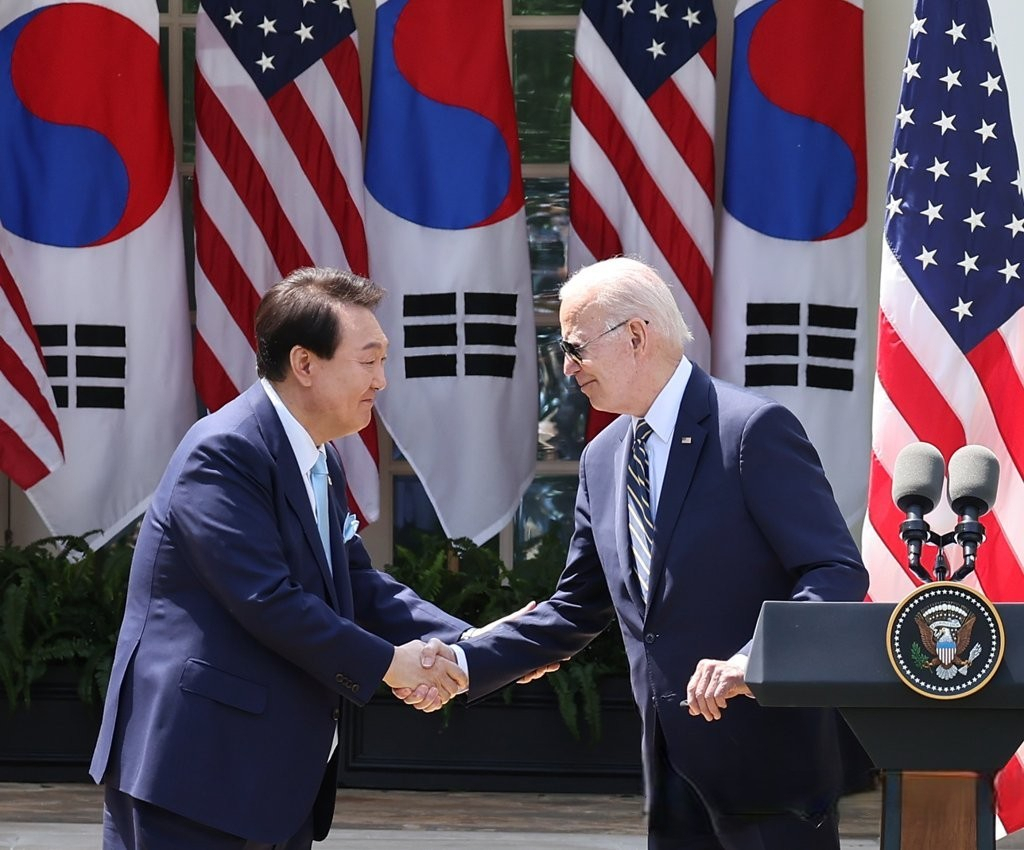Washington Declaration will help deter N. Korean threat but not a 'nuclear sharing' agreement: US official
By YonhapPublished : April 28, 2023 - 11:32

WASHINGTON -- The agreement reached by the leaders of South Korea and the United States on strengthening US extended deterrence is not an agreement designed to enable sharing of nuclear weapons between the allies, a senior US official said Thursday.
The official noted the agreement, dubbed the Washington Declaration, is designed to address North Korea's evolving threats and nuclear rhetoric, but is not "nuclear sharing."
"So let me just be very direct. I don't think that we see this as a de facto nuclear sharing," said Edgard Kagan, special assistant to the president and senior director for East Asia and Oceania of the National Security Council.
His remarks come one day after South Korea's deputy national security adviser, Kim Tae-hyo, argued that the joint declaration will make the people of South Korea "feel that they are sharing nuclear weapons with the United States."
South Korean President Yoon Suk Yeol and US President Joe Biden issued the joint statement Wednesday after holding a bilateral summit in Washington.
The agreement calls for the establishment of the Nuclear Consultative Group, which US officials said will provide additional insights into how the US plans and prepares for major nuclear contingencies.
"I think that we see this as a very significant strengthening of the partnership and the alliance between the ROK and the United States," Kagan said of the Washington Declaration, referring to South Korea by its official name, the Republic of Korea.
"We see this as a very important way to respond to the very obvious challenges that are being posed by the DPRK's very aggressive testing, but also rhetoric," he added while speaking with South Korean reporters in Washington.
DPRK stands for the Democratic People's Republic of Korea, the North's formal name.
When asked about a possible difference between Seoul and Washington in how they view the Washington Declaration from the very start, the NSC official noted it is a "very significant step" that will allow "better cooperation, better understanding between our governments talking about very sensitive issues."
"I think that from our standpoint, we say nuclear sharing, that has very significant implications. I think that the important thing is what this is, and what this is is a very significant step," Kagan said.
Senior US administration officials earlier said the NCG is modeled after NATO's nuclear policy planning body, the Nuclear Planning Group.
Kagan explained the NCG will be fundamentally different from NATO's Nuclear Planning Group in that it will be a bilateral arrangement and one between a nuclear state, the United States, and a non-nuclear state.
"And I think we've also made clear that we are working as partners, that this is an area where, obviously, there are significant differences between the United States and the ROK, in terms of the US being a nuclear state under the (Nuclear Non-Proliferation Treaty)," he said.
"But we believe that there's tremendous room to do more together, and we look forward to doing that," Kagan added.
The Washington Declaration comes after a debate in Seoul, partly prompted by President Yoon, on whether the country should consider arming itself with its own nuclear weapons.
Seoul reaffirmed its non-proliferation obligations under the NPT in the Washington Declaration. (Yonhap)



















![[Today’s K-pop] Treasure to publish magazine for debut anniversary](http://res.heraldm.com/phpwas/restmb_idxmake.php?idx=642&simg=/content/image/2024/07/26/20240726050551_0.jpg&u=)